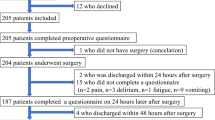Abstract
Purpose
The quality of recovery score QoR-40 is a recovery-specific and patient-rated questionnaire to assess the early postoperative health status of patients. However, the Japanese version of the QoR40 has not been established. The aim of this study was to validate the quality of recovery 40 Japanese version (the QoR-40J) according to the methods adopted by the International Quality of Life Assessment (IQOLA) project.
Methods
After obtaining ethics committee approval and consent, 192 general and otological surgical patients were studied. The QoR-40J was used to measure postoperative health status on day 3 and 1 month after surgery. The level of quality of life was also evaluated using a general, health-related quality of life questionnaire (Short-Form Health Survey-36 sub-scales; SF-36), at 1 month after the surgery. Psychometric analysis including the following properties: test–retest reliability, internal consistency, predictive validity, and measurement of responsiveness, was performed to validate the QoR-40J.
Results
Test–retest reliability (Spearman’s correlation coefficient) and internal consistency (Cronbach’s α) of the QoR-40J were 0.887 and 0.91, respectively. A significant relationship was observed between the total QoR-40J score and duration of hospitalization (r = −0.291) and between the global QoR-40J score and postoperative scores of the SF-36 sub-scales (physical function, ρ = 0.287; vital score, ρ = 0.349). The standardized mean of the QoR-40J, a measurement of responsiveness, was 0.70.
Conclusion
The results of the psychometric analysis indicated that the QoR-40J has characteristics of acceptable validity, reliability, and responsiveness in clinical practice in Japan. The QoR-40J may aid in evaluating the quality of recovery after surgery or the quality of methods of anesthesia.
Similar content being viewed by others
References
Myles PS, Weitkamp B, Jones K, Melick J, Hensen S. Validity and reliability of a postoperative quality of recovery score: the QoR-40. Br J Anaesth. 2000;84:11–5.
Troedel S, Leslie K, Irwin K, Pearce F, Ugoni A, Gillies R, Pemberton E, Dharmages S. Quality of recovery from anaesthesia in neurosurgical patients. Anesthesiology. 2003;99:1158–65.
Myles PS, Hunt JO, Fletcher H, Solly R, Woodward D, Kelly S. Relation between quality of recovery in hospital and quality of life at 3 months after cardiac surgery. Anesthesiology. 2001;95:862–7.
Bost JE, Williams BA, Bottegal MT, Dang Q, Rubio DM. The 8-item short-form health survey and the physical comfort composite score of the quality of recovery 40-item scale provide the most responsive assessments of pain, physical function, and mental function during the first 4 days after ambulatory knee surgery with regional anaesthesia. Anesth Analg. 2007;105:1693–700.
Bullinger M, Alonso J, Apolone G, Leplège A, Sullivan M, Wood-Dauphinee S, Gandek B, Wagner A, Aaronson N, Bech P, Fukuhara S, Kaasa S, Ware JE Jr. Translating health status questionnaires and evaluating their quality: the IQOLA project approach. J Clin Epidemiol. 1998;51:913–23.
Fukuhara S, Bito S, Green J, Hisao A, Kurokawa K. Translation, adaptation and validation of the SF-36 Health Survey for use in Japan. J Clin Epidemiol. 1998;51:1037–44.
Spector PE. Summated rating scale construction: an introduction. Sage University Paper series on quantitative application in social science, No. 82. London: SAGE Publication Inc.; 1992.
Myles PS, Hunt JO, Nightingale CE, Fletcher H, Beh T, Tanil D, Nagy A, Rubinstein A, Ponsford JL. Development and psychometric testing of a quality of recovery score after general anaesthesia and surgery in adults. Anesth Analg. 1999;88:83–90.
Katz JN, Larson MG, Phillips CB, Fossel AH, Liang MH. Comparative measurement sensitivity of short and longer health status instruments. Med Care. 1992;30:917–25.
McDowell I, Newell C. Measuring health: a guide to rating scales and questionnaires. 2nd ed. New York: Oxford University Press; 1996.
Acknowledgments
We thank Professor Paul Myles for granting us permission to translate the QoR40 into Japanese.
Author information
Authors and Affiliations
Corresponding author
Appendix 1
Appendix 1
Please rate the quality of your recovery on this scale by placing an X on the line.
For example, if you have a very good recovery, you would mark the line like this

.
About this article
Cite this article
Tanaka, Y., Wakita, T., Fukuhara, S. et al. Validation of the Japanese version of the quality of recovery score QoR-40. J Anesth 25, 509–515 (2011). https://doi.org/10.1007/s00540-011-1151-2
Received:
Accepted:
Published:
Issue Date:
DOI: https://doi.org/10.1007/s00540-011-1151-2




